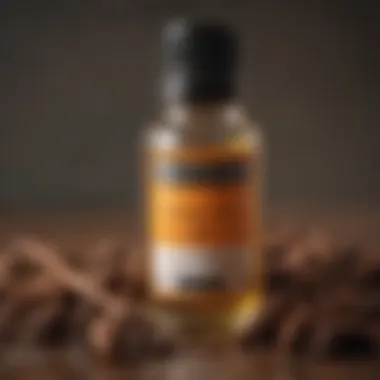Harnessing Essential Oils for Effective Mouse and Rat Control


Preventive Pest Control Strategies
When it comes to maintaining a pest-free environment, implementing preventive pest control strategies is crucial. One key aspect is safeguarding your house exterior by sealing any cracks that may serve as entry points for pests. Additionally, clearing debris and ensuring there are no easy ways for pests to enter your home is essential. In terms of yard maintenance, following essential care routines and utilizing methods to keep your yard pest-free can significantly reduce the risk of infestations. Inside your home, expert cleaning tips and techniques play a major role in maintaining a pest-resistant environment. Efficient waste disposal methods are also vital in preventing pests from being attracted to your living space. Lastly, considering innovative ways to safeguard your home can provide additional layers of protection.
Identifying Pest Risk Areas
Conducting thorough inspections to identify potential pest risk areas is another critical step in effective pest control. Paying close attention to moisture-prone areas and promptly addressing any damp conditions can prevent infestations from taking root. Inspecting cracks and crevices for possible entry points for pests is equally important, and sealing these areas effectively can deter unwanted visitors. Greenery inspections are also essential to understand the impact of plants on pest presence and to maintain yards free from infestations. Keeping an eye on other miscellaneous pest risk areas and implementing preventive measures accordingly completes this comprehensive identification process.
Introduction
In the realm of pest control, the utilization of essential oils to combat mice and rats presents a compelling and eco-conscious alternative to traditional methodologies. This article delves deep into the efficacy and nuances of using essential oils for pest management, shedding light on their natural and non-toxic properties. By exploring a range of essential oils and how they interact with rodents, readers will uncover a holistic approach to pest control that prioritizes sustainability and safety.
Significance of Pest Control
Health Risks Associated with Rodents
Delving into the health risks posed by rodents unveils a critical facet of the pest control discussion. Rodents are notorious carriers of diseases such as leptospirosis, hantavirus, and salmonellosis, posing a significant threat to human health. By harboring bacteria and parasites, rodents can easily transmit these pathogens to humans through contact with food sources or surfaces. Understanding the health risks associated with rodents underscores the imperative of effective pest management strategies to safeguard both property and well-being.
Environmental Impact of Chemical Pest Control
The environmental ramifications of conventional chemical pest control methods are notable within the discourse of sustainable living. Chemical pesticides not only pose a hazard to non-target species but also contribute to water and soil contamination, disrupting natural ecosystems. Embracing essential oils for rodent control stands as a pivotal step towards mitigating these adverse effects. By opting for natural solutions, individuals can reduce their carbon footprint and promote a healthier environment, aligning with the ethos of eco-friendly practices.
Rise of Natural Remedies
Shift Towards Organic Pest Management
The shift towards organic pest management signifies a paradigmatic change in how individuals approach pest control. Organic solutions emphasize the utilization of environmentally friendly compounds derived from nature, steering away from synthetic chemicals with harmful repercussions. This movement advocates for a harmonious coexistence with the ecosystem, recognizing the interconnectedness of all living beings. Incorporating organic pest management techniques not only ensures the safety of inhabitants but also fosters a sustainable habitat for future generations.
Benefits of Using Essential Oils
Unveiling the benefits of utilizing essential oils for pest control illuminates their transformative potential in mitigating rodent infestations. Essential oils exhibit a multifaceted array of properties, including antimicrobial, repellent, and non-toxic attributes, making them ideal candidates for pest deterrents. By harnessing the power of natural compounds like peppermint oil, eucalyptus oil, and tea tree oil, individuals can repel rodents effectively without compromising on health or environmental well-being. The efficacy of essential oils not only lies in their pest repellent properties but also in their capacity to create a fragrant and soothing ambiance, enhancing living spaces while keeping pests at bay.
Understanding Essential Oils


Understanding Essential Oils is a crucial aspect of this article as it delves into the foundation of using natural solutions like essential oils to combat pests such as mice and rats effectively. By comprehensively exploring the properties, benefits, and considerations of essential oils, readers can develop a profound understanding of why these oils serve as a viable alternative to traditional pest control methods.
Properties of Essential Oils
Antimicrobial
Antimicrobial properties in essential oils play a pivotal role in pest control by effectively combating harmful microorganisms. This characteristic enables essential oils to not only repel pests but also eliminate potential health risks associated with rodents. The unique feature of antimicrobial properties lies in their ability to provide a natural and non-toxic solution to pest problems, making them a popular choice for environmentally conscious individuals seeking effective pest management.
Repellent
Essential oils with repellent properties contribute significantly to pest control by deterring mice and rats from infesting homes. The primary characteristic of repellent essential oils is their ability to create an inhospitable environment for rodents, ultimately driving them away. While the unique feature of repellent oils lies in their natural and safe repellency, it is important to consider their limitations in achieving long-term pest eradication.
Non-toxic
The non-toxic nature of essential oils sets them apart from chemical pest control methods, making them a preferred choice for individuals looking to maintain a safe and eco-friendly living environment. This key characteristic of essential oils ensures that pest control can be achieved without posing risks to human health or the surrounding ecosystem. However, while non-toxic essential oils are beneficial in promoting a healthy home environment, their effectiveness may vary based on specific pest infestations.
Popular Essential Oils for Pest Control
Peppermint Oil
Peppermint oil is a popular choice for pest control due to its strong scent that acts as a natural repellent against rodents. The key characteristic of peppermint oil lies in its ability to create an unpleasant environment for pests, driving them away effectively. While the unique feature of peppermint oil is its aromatic properties, it is essential to note its limitations in prolonged pest management.
Eucalyptus Oil
Eucalyptus oil is favored for pest control purposes because of its potent fragrance that deters mice and rats from nesting in households. The primary characteristic of eucalyptus oil is its ability to repel pests naturally, making it a preferred choice for those seeking non-toxic solutions. The unique feature of eucalyptus oil lies in its versatility in repelling various pests, although its effectiveness may diminish over time.
Tea Tree Oil
Tea tree oil serves as an effective pest control remedy due to its anti-microbial properties that inhibit the growth of bacteria, fungi, and other harmful microorganisms. The key characteristic of tea tree oil is its ability to not only repel rodents but also disinfect areas prone to infestation. While the unique feature of tea tree oil lies in its multi-functional benefits, it is essential to consider its potential disadvantages in certain pest control scenarios.
Choosing the Right Essential Oil
Consideration of Effectiveness
Evaluating the effectiveness of essential oils is a critical aspect when choosing the right option for pest control. The key characteristic of this consideration lies in determining the efficacy of essential oils based on individual pest management needs. While the unique feature of evaluating effectiveness ensures targeted pest control solutions, it is important to acknowledge that some oils may require trial and error to identify the most suitable option.


Personal Preferences
Personal preferences play a significant role in selecting the right essential oil for pest control, as individual preferences regarding scent, application methods, and sustainability can influence decision-making. The key characteristic of personal preferences is the customization of pest control strategies to align with personal values and practicality. While the unique feature of personal preferences offers a tailored approach to pest management, it is essential to balance personal choices with the effectiveness of the selected essential oil.
Application Methods
In the realm of pest control, the application methods play a crucial role in ensuring the effective use of essential oils to eliminate mice and rats. These methods serve as the bridge between the properties of essential oils and their practical application in pest management strategies. When it comes to employing essential oils to combat rodent infestations, choosing the right application method is essential for optimal results. By understanding the specific elements, benefits, and considerations of application methods, individuals can maximize the potency of essential oils in tackling these unwanted intruders.
Direct Application
Direct application methods, such as the Cotton Balls Method and Spray Bottle Method, offer direct and targeted approaches to pest control using essential oils.
Cotton Balls Method:
The Cotton Balls Method involves saturating cotton balls with essential oils and strategically placing them in areas frequented by mice and rats. This method capitalizes on the strong scent of essential oils, particularly peppermint oil, which rodents find repugnant. The key characteristic of the Cotton Balls Method lies in its simplicity and effectiveness in repelling rodents without resorting to harmful chemicals. Its non-toxic nature makes it a popular choice among individuals seeking natural and environmentally-friendly pest control solutions. Despite its advantages, one downside is that the scent may diminish over time, requiring frequent replenishment for sustained efficacy.
Spray Bottle Method:
The Spray Bottle Method entails diluting essential oils with water and spraying the solution in areas where rodent activity is observed. This method offers a versatile and easy-to-use approach to applying essential oils, allowing for broader coverage of targeted spaces. The key characteristic of the Spray Bottle Method is its convenience and ability to create a barrier that deters rodents from entering specific areas. While highly effective in the short term, the main advantage of this method is its immediate impact on pest behavior. However, continuous reapplication may be necessary to ensure long-term effects.
Diffusion Techniques
Utilizing diffusion techniques, such as Ultrasonic Diffusers and Evaporative Diffusers, provides a more strategic and continuous method of dispelling essential oils to repel mice and rats.
Ultrasonic Diffusers:
Ultrasonic diffusers operate by breaking down essential oils into micro-particles and dispersing them into the air through ultrasonic vibrations. This method offers a comprehensive and continuous distribution of essential oils across large spaces, making it ideal for ongoing pest management. The key characteristic of Ultrasonic Diffusers lies in their efficiency in diffusing essential oils evenly throughout the environment, creating a pervasive barrier against rodents. While advantageous for long-term use, some considerations include the need for regular refilling and maintenance to sustain effectiveness.
Evaporative Diffusers:
Evaporative diffusers work by allowing essential oils to evaporate naturally into the air, releasing their aromatic compounds over time. This method provides a consistent and gradual diffusion of essential oils, ensuring a steady presence of repelling scents in the targeted areas. The key characteristic of Evaporative Diffusers is their simplicity and silent operation, making them a discreet option for pest control. While effective in maintaining a constant repellent effect, one drawback could be the limited coverage area compared to other diffusion techniques.
Effectiveness and Considerations


In this segment of the article, we delve into the crucial topic of the effectiveness and considerations when using essential oils to repel and eliminate mice and rats. Understanding the nuances of how these natural remedies work is essential for implementing a successful pest management strategy. By exploring the specific elements and benefits of effectiveness and considerations, readers can make informed decisions when tackling rodent infestations.
Duration of Effects
Short-Term vs Long-Term Results:
Comparing the short-term and long-term results of essential oils in pest control is vital for comprehending their efficacy over time. Short-term results often involve immediate repellent effects on rodents, providing quick relief from infestation. Conversely, long-term results focus on sustained protection against future infestations by creating an inhospitable environment for mice and rats. The key characteristic of this comparison lies in balancing instant efficacy with lasting prevention, offering a holistic approach to rodent control. Short-term benefits include rapid action, while long-term advantages ensure prolonged security from infestations. Understanding this distinction allows homeowners to tailor their pest control methods to suit their specific needs.
Safety Precautions
Dilution Guidelines:
Diving into dilution guidelines is paramount for safe and effective usage of essential oils in pest management. Proper dilution ensures that the oils maintain their potency while minimizing any potential risks to health or the environment. The key characteristic of dilution guidelines is their ability to strike a balance between effectiveness and safety, optimizing the benefits of essential oils without causing harm. Adhering to these guidelines guarantees that the oils remain potent against rodents while being gentle enough for household use. Following dilution recommendations empowers users to harness the full potential of essential oils without compromising on safety or efficacy.
Pets and Children Safety:
Addressing the safety of pets and children when using essential oils for pest control is critical in creating a secure home environment. The key characteristic of pets and children safety guidelines is prioritizing the protection of vulnerable family members from any potential hazards of essential oils. Ensuring that oils are stored securely, away from reach, and using pet-friendly blends enhances safety measures. The unique feature of this aspect lies in promoting a nurturing environment where both pest control and family well-being are upheld. By following these safety precautions, homeowners can safeguard their loved ones while effectively managing rodent issues.
Environmental Impact
Biodegradability:
Exploring the biodegradability of essential oils underscores their eco-friendly nature and minimal impact on the environment. Biodegradability refers to the ability of substances to decompose naturally without causing harm to ecosystems. The key characteristic of biodegradable oils is their sustainable disposal, reducing environmental pollution and promoting greener pest control alternatives. Leveraging biodegradable essential oils aligns with environmentally conscious practices, contributing to a healthier ecosystem. Embracing this aspect ensures that pest control efforts do not compromise environmental integrity, fostering a harmonious relationship between human habitats and nature.
Eco-Friendly Pest Control:
Examining the concept of eco-friendly pest control emphasizes the shift towards sustainable and non-toxic methods of rodent management. Eco-friendly practices aim to mitigate harm to the environment while effectively eradicating pests. The key characteristic of eco-friendly pest control is its holistic approach, considering the well-being of both humans and the ecosystem. The unique feature lies in promoting harmony between pest management and environmental preservation, creating a balance that benefits all. Implementing eco-friendly pest control measures not only ensures effective rodent eradication but also upholds a commitment to safeguarding the planet for future generations.
Conclusion
In the realm of pest management, the utilization of essential oils presents a revolutionary avenue towards effectively combatting rodent infestations with a focus on natural and non-toxic solutions. Throughout this article, the exploration of essential oils and their potent properties has shed light on the efficacy and practicality of incorporating these botanical extracts into everyday pest control practices. Offering a holistic approach that not only addresses the immediate concerns of rodent intrusion but also takes into account the broader environmental impact, essential oils stand out as a compelling alternative to conventional chemical-laden methods.
Embracing Natural Solutions
Advantages Over Chemical Methods
Delving into the realm of natural pest control, essential oils showcase a range of unique advantages over traditional chemical methods. One pivotal aspect lies in the non-toxicity of essential oils, safeguarding both the well-being of inhabitants and the ecosystem at large. Unlike chemical pesticides that pose health risks to humans and wildlife, essential oils provide a safe and sustainable means of pest management. Their biodegradability further underscores their eco-friendly nature, ensuring minimal harm to the environment while effectively curbing rodent populations.
Sustainable Pest Management
Embracing the ethos of sustainability, the concept of Sustainable Pest Management aligns seamlessly with the utilization of essential oils. By opting for botanical solutions derived from renewable plant sources, individuals contribute to a more environmentally conscious approach to pest control. Sustainable Pest Management encourages a long-term perspective, emphasizing the importance of prevention alongside intervention. This methodology not only mitigates immediate pest issues but establishes a framework for lasting pest management practices that prioritize harmony between human habitation and the natural world.



